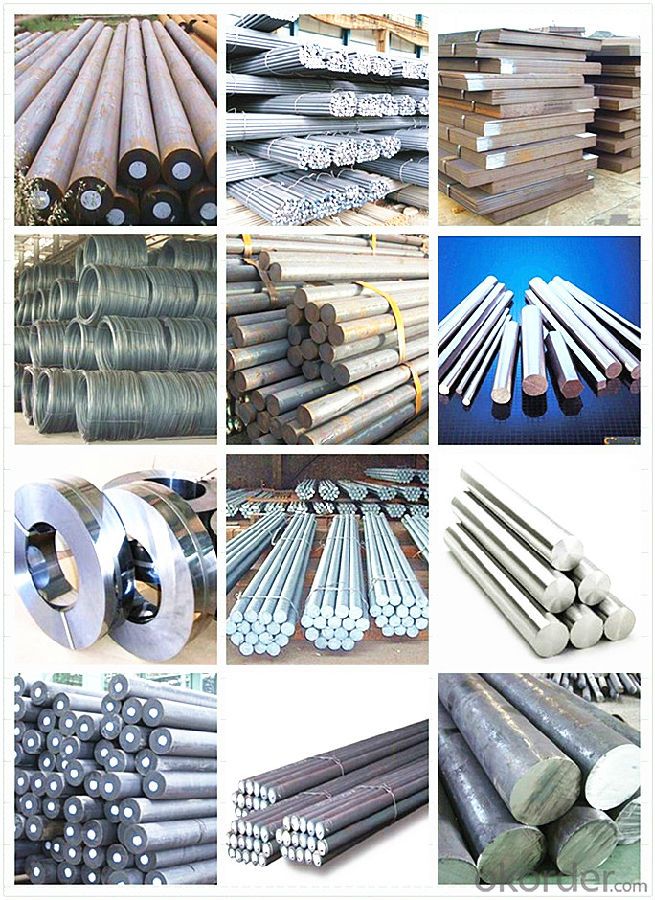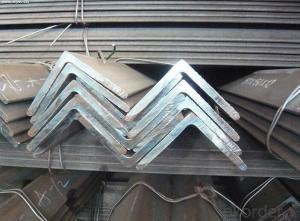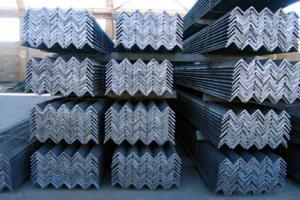Equal-Unequal Black & Galvanized Steel Angle Bar
- Loading Port:
- Tianjin
- Payment Terms:
- TT OR LC
- Min Order Qty:
- 3 m.t.
- Supply Capability:
- 10000 m.t./month
OKorder Service Pledge
OKorder Financial Service
You Might Also Like
Item specifice
Detailed Informaion
Name | Equal/Unequal Angle Steel Bar |
Shape | Equal/Unequal Angle |
Standard | GB/ASTM/SAE/AISI/DIN/JIS/EN/BS |
Surface Treatment: | Black/Peeling/Polished/Machined |
Delivery Condition: | Hot Rolled or Forged/Peeled or Black Surface |
Test | SGS/UT 100% Elements Testing |
Certificate: | ISO/Mill Certificate |
Service: | 24 hours online service / |
more than 20 years trading and manufacture | |
Quality Assurance: | the third party inspection, such as SGS, BV, TUV…etc. is acceptable |
Packaging Details: | Seaworthy Packaging or as per customer's packing instruction |
Specification
Specification | Weight | Specification | Weight |
Leg length*leg length*thickness |
| Leg length*leg length*thickness | (kg/m) |
(mm) | (kg/m) | (mm) |
|
25*25*3 | 1.124 | 90*90*8 | 10.946 |
25*25*4 | 1.459 | 90*90*10 | 13.476 |
30*30*3 | 1.373 | 100*100*6 | 9.366 |
30*30*4 | 1.786 | 100*100*7 | 10.83 |
40*40*3 | 1.852 | 100*100*8 | 12.276 |
40*40*4 | 2.422 | 100*100*10 | 15.12 |
40*40*5 | 2.976 | 100*100*12 | 17.898 |
45*45*3 | 2.088 | 110*110*7 | 11.928 |
45*45*4 | 2.736 | 110*110*8 | 13.532 |
45*45*5 | 3.369 | 110*110*10 | 16.69 |
50*50*3 | 2.332 | 110*110*12 | 19.782 |
50*50*4 | 3.059 | 125*125*8 | 15.504 |
50*50*5 | 3.77 | 125*125*10 | 19.133 |
50*50*6 | 4.465 | 125*125*12 | 22.696 |
63*63*5 | 4.822 | 125*125*14 | 26.193 |
63*63*6 | 5.721 | 140*140*10 | 21.488 |
63*63*8 | 7.469 | 140*140*12 | 25.522 |
70*70*5 | 5.397 | 140*140*14 | 29.49 |
70*70*6 | 6.406 | 160*160*10 | 24.729 |
70*70*7 | 7.398 | 160*160*12 | 29.391 |
70*70*8 | 8.373 | 160*160*14 | 33.987 |
75*75*5 | 5.818 | 160*160*16 | 38.518 |
75*75*6 | 6.905 | 180*180*12 | 33.159 |
75*75*7 | 7.976 | 180*180*14 | 38.383 |
75*75*8 | 9.03 | 180*180*16 | 43.542 |
75*75*10 | 11.089 | 180*180*18 | 48.634 |
80*80*6 | 7.376 | 200*200*14 | 42.894 |
80*80*7 | 8.525 | 200*200*16 | 48.68 |
80*80*8 | 9.658 | 200*200*18 | 54.401 |
80*80*10 | 11.874 | 200*200*20 | 60.056 |
90*90*6 | 8.35 | 200*200*24 | 71.168 |
90*90*7 | 9.656 |
|
|
Company Introduction
CNBM International Corporation is the most import and export platform of CNBM group(China National Building Material Group Corporation) ,which is a state-owned enterprise, ranked in 270th of Fortune Global 500 in 2015.
With its advantages, CNBM International are mainly concentrate on Cement, Glass, Iron and Steel, Ceramics industries and devotes herself for supplying high quality series of refractories as well as technical consultancies and logistics solution.
Packaging & Delivery
Packaging Detail | Sea worthy packing /as per customer's packing instruction |
Delivery Detail | 15 ~ 40 days after receiving the deposit |
Product Show

FAQ
Are you a trading company or manufacturer? | Manufacturer |
What’s the MOQ? | 3 metric ton |
What’s your delivery time? | 15-35 days after downpayment received |
Do you Accept OEM service? | Yes |
what’s your delivery terms? | FOB/CFR/CIF |
What's the Payment Terms? | 30% as deposit,70% before shipment by T/T |
Western Union acceptable for small amount. | |
L/C acceptable for large amount. | |
Scrow ,Paybal,Alipay are also ok | |
Why choose us? | Chose happens because of quality, then price, We can give you both. |
Additionally, we can also offer professional products inquiry, products knowledge train (for agents), smooth goods delivery, excellent customer solution proposals. | |
What's your available port of Shipment? | Main Port, China |
What’s your featured services? | Our service formula: good quality+ good price+ good service=customer's trust |
Where are your Market? | Covering more than 160 countries in the world |
- Q:How does special steel perform in electrical conductivity applications?
- Special steel, which is also known as stainless steel, offers exceptional electrical conductivity properties in a wide range of applications. It finds extensive use in electrical engineering and electronics owing to its high resistance against corrosion and low electrical resistance. By incorporating specific alloys like chromium and nickel, its conductivity is further enhanced, making it the ideal option for efficient electricity conduction. Within electrical conductivity applications, special steel demonstrates low resistivity, enabling the seamless flow of electrical current with minimal energy loss. Its low resistance plays a vital role in minimizing heat generation, which is crucial for preventing overheating and ensuring the efficient functioning of electrical components. Special steel also possesses outstanding magnetic properties, making it a suitable choice for applications that demand both electrical conductivity and magnetic strength. This attribute proves particularly beneficial in the production of transformers, motors, and generators. Furthermore, special steel boasts exceptional durability and the ability to withstand harsh environmental conditions, making it well-suited for outdoor applications. Its corrosion resistance prevents the formation of rust, ensuring a long lifespan and consistent performance even in challenging environments. In conclusion, special steel is an excellent material for electrical conductivity applications due to its low electrical resistance, high corrosion resistance, and exceptional durability. Its unique properties make it the preferred choice in various industries that rely on efficient and dependable electrical conductivity.
- Q:What are the main characteristics of spring steel?
- Spring steel is a type of high-carbon steel that is specifically designed to possess excellent elasticity and resilience. It is primarily known for its ability to return to its original shape after being bent or deformed, making it ideal for applications where repeated and controlled deflection is required. The main characteristics of spring steel include: 1. High Yield Strength: Spring steel is characterized by its high yield strength, which refers to the amount of stress it can withstand before permanent deformation occurs. This allows it to bear heavy loads and resist bending or breaking under pressure. 2. Excellent Elasticity: One of the most significant characteristics of spring steel is its exceptional elasticity. It can be flexed, twisted, or stretched without permanently deforming, and once the force is released, it returns to its original shape. This property is crucial for applications requiring constant and repetitive motion. 3. Superior Fatigue Resistance: Spring steel is exceptionally resistant to fatigue, meaning it can endure millions of cycles of stress without failing. This characteristic is crucial for products subjected to continuous and repetitive loads, such as springs in automotive suspensions or industrial machinery. 4. Good Hardness and Wear Resistance: Spring steel is typically hardened to enhance its wear resistance. This allows it to withstand abrasion and deformation under harsh conditions, making it suitable for applications that involve friction or impact, such as cutting tools or automotive components. 5. Excellent Formability: Spring steel can be easily formed into various shapes and sizes, making it highly versatile for different applications. It can be cold-drawn, rolled, or heat-treated to achieve specific mechanical properties, allowing manufacturers to customize its characteristics based on their specific requirements. Overall, the main characteristics of spring steel are its high yield strength, excellent elasticity, superior fatigue resistance, good hardness and wear resistance, and exceptional formability. These qualities make it a vital material in a wide range of industries, including automotive, aerospace, construction, and manufacturing.
- Q:How is special steel used in the production of aircraft landing gear?
- Special steel is widely used in the production of aircraft landing gear due to its exceptional mechanical properties and durability. The landing gear is a critical component of an aircraft that supports its weight during takeoff, landing, and ground operations. It must withstand immense forces, impact loads, and harsh environmental conditions. Special steel, such as high-strength low-alloy (HSLA) steel or alloy steel, is specifically chosen for its superior strength-to-weight ratio, high fatigue resistance, and excellent corrosion resistance. These properties are vital for ensuring the landing gear's ability to withstand the extreme forces and stresses encountered during aircraft operations. The use of special steel in the production of landing gear provides several advantages. Firstly, it allows for a lighter weight landing gear, which contributes to the overall weight reduction of the aircraft, resulting in improved fuel efficiency and increased payload capacity. This is crucial for modern aircraft, as reducing weight is a key factor in enhancing performance and reducing operating costs. Secondly, special steel's high fatigue resistance ensures the landing gear can endure repeated loading cycles without any significant degradation in performance. This is critical as the landing gear experiences significant stress during each landing and takeoff, and it must be capable of withstanding these forces over a long operational lifespan. Furthermore, special steel's excellent corrosion resistance properties ensure the landing gear remains protected from environmental factors, such as moisture, salt, and other corrosive agents. Corrosion can weaken the structure of the landing gear, compromising its integrity and safety. Therefore, using special steel helps to ensure the landing gear's longevity and reliability, reducing maintenance requirements and costs. In summary, special steel plays a crucial role in the production of aircraft landing gear by providing exceptional strength, fatigue resistance, and corrosion resistance. Its use allows for lighter, more durable landing gear, resulting in improved aircraft performance, increased efficiency, and enhanced safety.
- Q:Can special steel be used in the power generation industry?
- Yes, special steel can be used in the power generation industry. Special steels, such as heat-resistant alloys and stainless steels, are commonly utilized in power plants for their high strength, corrosion resistance, and ability to withstand extreme temperatures and pressures. These steels are used in the construction of boilers, turbines, valves, and other critical components, ensuring the reliable and efficient operation of power generation facilities.
- Q:How does special steel perform in terms of impact resistance?
- Special steel generally performs well in terms of impact resistance. It is specifically engineered to have higher toughness and strength, allowing it to withstand impacts and deformations without fracturing or breaking easily. This makes special steel an excellent choice for applications that require durability and protection against sudden forces or impacts, such as in manufacturing machinery, construction equipment, and automotive components.
- Q:How does special steel contribute to the automotive emission reduction?
- Special steel contributes to automotive emission reduction in several ways. Firstly, it is used in the manufacturing of lightweight components, such as the body and chassis, which helps to reduce the overall weight of the vehicle. This, in turn, improves fuel efficiency and reduces emissions. Additionally, special steel can be used to produce more durable and efficient engine parts, such as pistons and crankshafts, which enhance the overall performance of the engine and reduce emissions. Furthermore, special steel is also utilized in the production of exhaust systems, where its high temperature resistance and corrosion resistance properties help to improve the efficiency of catalytic converters, leading to lower emissions of harmful pollutants. Overall, the use of special steel in the automotive industry plays a crucial role in reducing emissions and promoting environmental sustainability.
- Q:How does special steel contribute to the automotive material recycling?
- Special steel contributes to automotive material recycling in several ways. Firstly, special steel is highly durable and resistant to corrosion, making it ideal for use in various automotive components such as engine parts, chassis, and body structures. This durability ensures that these components have a longer lifespan, reducing the frequency of replacement and consequently reducing waste generation. Additionally, special steel is highly recyclable, meaning that at the end of a vehicle's life cycle, the steel components can be easily and efficiently recycled. The recycling process involves melting down the steel and reusing it to create new steel products, thereby reducing the need for extracting and processing raw materials. Furthermore, the use of special steel in lightweighting initiatives, where lighter materials are used to reduce a vehicle's weight, contributes to fuel efficiency and lower emissions. This is significant for automotive material recycling as lighter vehicles require less energy to operate, resulting in reduced fuel consumption and environmental impact. Overall, the use of special steel in the automotive industry plays a crucial role in promoting sustainability through extended component lifespan, efficient recycling processes, and improved fuel efficiency.
- Q:What are the different methods of non-destructive testing for special steel?
- There are several methods of non-destructive testing (NDT) for special steel, including magnetic particle testing, ultrasonic testing, radiographic testing, eddy current testing, and liquid penetrant testing. These techniques allow for the detection of defects or abnormalities in the material without causing any damage to the steel. Each method has its own advantages and limitations, and the choice of method depends on the specific requirements and characteristics of the steel being tested.
- Q:How does special steel perform in abrasive wear applications?
- Special steel is renowned for its outstanding performance in applications where abrasive wear is present. Its design specifically caters to endure the harsh conditions and high levels of abrasion that occur in diverse industrial processes. A notable characteristic of special steel is its remarkable hardness. It can effectively withstand the abrasive forces exerted by different materials, such as rocks, sand, or minerals, without experiencing significant wear or deterioration. Achieving this hardness involves a combination of alloying elements and heat treatment processes, which enhance the steel's ability to maintain its structural integrity even under extreme wear conditions. Furthermore, special steel often possesses a high level of toughness, allowing it to absorb impact and resist fracture or chipping. This property is particularly crucial in applications involving abrasive wear, where materials frequently collide and generate high levels of stress. The toughness of special steel enables it to withstand these impacts and sustain its performance over an extended period. Moreover, special steel exhibits excellent corrosion resistance, which is vital in abrasive wear applications that involve exposure to moisture, chemicals, or other corrosive agents. This resistance guarantees that the steel does not deteriorate or lose its effectiveness due to chemical reactions or oxidation, extending its lifespan and reducing the need for maintenance. To summarize, special steel excels in abrasive wear applications due to its hardness, toughness, and corrosion resistance. These properties enable it to endure the challenging conditions and high levels of abrasion encountered in various industrial processes, ensuring long-lasting performance and minimizing downtime.
- Q:How are titanium alloys used in the medical industry?
- Titanium alloys are widely used in the medical industry due to their biocompatibility and excellent mechanical properties. These alloys are used to manufacture medical implants, such as joint replacements, bone plates, and dental implants, as they have a low risk of rejection by the body and can withstand the stresses of daily activities. Additionally, titanium alloys are used in surgical instruments and equipment, as they are lightweight, durable, and resistant to corrosion, ensuring patient safety and long-term performance.
1. Manufacturer Overview |
|
|---|---|
| Location | |
| Year Established | |
| Annual Output Value | |
| Main Markets | |
| Company Certifications | |
2. Manufacturer Certificates |
|
|---|---|
| a) Certification Name | |
| Range | |
| Reference | |
| Validity Period | |
3. Manufacturer Capability |
|
|---|---|
| a)Trade Capacity | |
| Nearest Port | |
| Export Percentage | |
| No.of Employees in Trade Department | |
| Language Spoken: | |
| b)Factory Information | |
| Factory Size: | |
| No. of Production Lines | |
| Contract Manufacturing | |
| Product Price Range | |
Send your message to us
Equal-Unequal Black & Galvanized Steel Angle Bar
- Loading Port:
- Tianjin
- Payment Terms:
- TT OR LC
- Min Order Qty:
- 3 m.t.
- Supply Capability:
- 10000 m.t./month
OKorder Service Pledge
OKorder Financial Service
Similar products
New products
Hot products
Related keywords

































